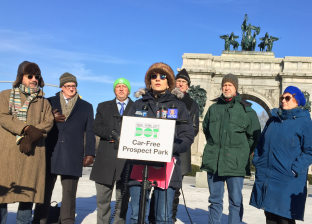What’s the Status of Car-Free Central Park and Prospect Park in 2014?
Last year, the city announced that much of Central Park’s loop drives would go car-free all summer long. With temperatures warming, the park is again filling with people walking, jogging, and biking — all sharing space with car commuters looking for a rush-hour shortcut. Will it happen again — or expand — this year? Negotiations are underway to bring a car-free summer back to Central Park, and meanwhile it’s still an open question whether Prospect Park users will get similar summer traffic relief for the first time.

The movement for car-free parks has gained momentum and major political support after years of advocacy, yielding design changes to park roads and steady expansions of car-free hours in two of the city’s busiest parks.
The push for a car-free Central Park has been complicated of late by a de Blasio administration pledge to ban horse carriages and replace them with old-timey electric cars in the park. Last week, the Central Park Conservancy came out against the electric cars, saying they would “increase congestion” and “make the park less safe.” Cars in the park are tied with crowds as the top complaint of Central Park visitors, according to a 2011 survey by the conservancy [PDF].
Horse carriage operators have seized upon the car-free park message to argue against a ban on their industry. “As carriage drivers, our priority is safety,” said carriage industry spokesperson Christina Hansen in a statement released by the Teamsters union. “With tens of thousands of injuries caused by car crashes every year in New York City, why bring cars into Central Park at all times of day?”
The landscape has also shifted across the East River, where Brooklyn Borough President Eric Adams took over from car-free Prospect Park opponent Marty Markowitz. It remains to be seen, however, if Adams will become a champion of getting cars out of the park. His old state Senate district included the park, and he has a record of equivocating on the issue. “I would love, ideally, to close all our parks to vehicular traffic, but I don’ t want to do it in a manner that would put the surrounding communities into an environmental or traffic shock,” he told Patch in 2011.
Adams’s Manhattan counterpart, Gale Brewer, has a much more direct take on Central Park. “I remain committed to a permanent ban on cars in the park,” Brewer said in a statement. “In the meantime, an almost car-free park in the summer months is a great initiative and should continue.”
“We’ve been advocating for them to bring back the pilot this year,” said Eleni Bourinaris-Suarez, a spokesperson for City Council Parks Committee Chair Mark Levine, whose district abuts Central Park. “We have no reason to believe that they’re not going to do it again.”
“We’re in negotiations with Parks Department now, so it’s premature to comment,” said Marisa Maack, chief of staff to Council Member Helen Rosenthal, whose district includes Central Park and is a self-described “strong supporter” of closing its loop drives to cars. “Call me in a week or two,” Maack said.
The Parks Department and DOT have not responded to inquiries. Transportation Commissioner Polly Trottenberg said last week to “stay tuned” for an announcement about car-free parks.
